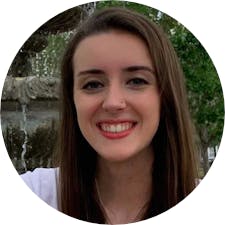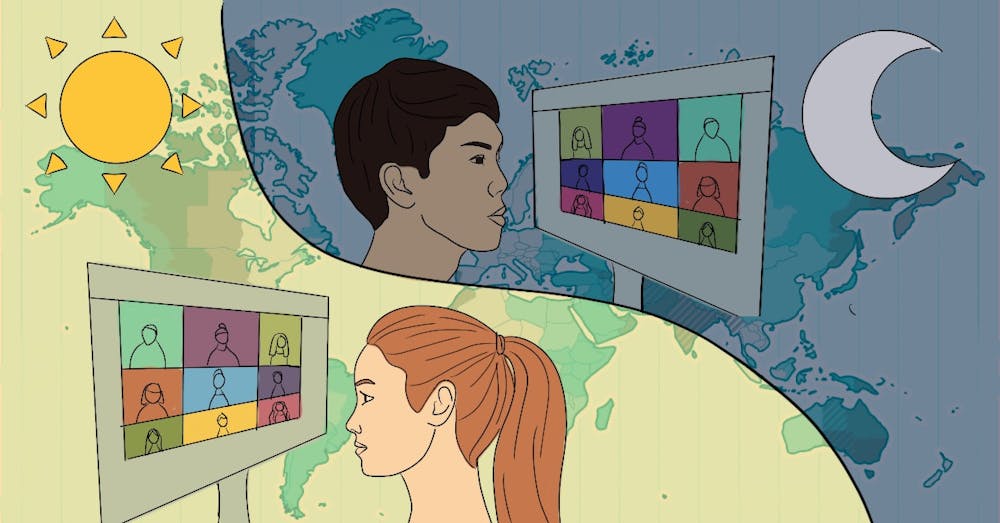An alarm blared at 4:45 a.m. in Oulu, Finland, jolting Meri Karioja to wake up for a proctored physics exam in 15 minutes.
She rolled out of bed and scrambled to scarf down protein-packed peanut butter and chia seed overnight oats before groggily making her way to her desk in the living room. The calculator, scratch paper and photo ID she laid out the night before awaited her.
Her cat, Filip, meowed as she launched her exam, upset about being locked away in Meri’s bedroom.
The 21-year-old UF applied physiology and kinesiology junior mustered up the strength to endure the two-hour exam before throwing herself back under her covers. She slept for another three hours, then peeled herself out of bed again for a six-hour shift at work.
Karioja said the experience felt like being jet-lagged after a long flight.
When the arrival of the COVID-19 pandemic last March forced a campus shut down, UF students and faculty fled home to complete classes and work remotely. Some international students like Karioja have yet to return to campus.
Completing coursework online poses challenges for students and instructors alike, but these issues are heightened for some international students who attend classes and take exams amid drastic time zone differences.
Only 302 out of about 700 incoming Spring international students who were issued I-20 forms, which allow them to apply for F-1 student visas, actually entered the United States, checked in and registered full time for the semester, Martine Angrand, UF’s International Center director of F-1 International Student Compliance Services, wrote in an email.
The approximately 400 students who did not enter the country either deferred to a future semester, enrolled in at least one course while remaining abroad or chose to attend another university, which subsequently canceled their I-20s, she wrote.
Though he could not provide exact numbers, the dean of UF’s International Center, Leonardo Villalón, said he is certain there was an increase in the number of international students who are remaining at home this academic year.
“Under normal circumstances, it’s very, very few,” he said. “If any.”
Karioja said the physics exam she took was originally scheduled for 3 a.m., but she asked for it to be pushed back, and it was — by two hours. She said her professor wanted to prevent any academic dishonesty.
“Luckily, I woke up,” she said. “I was stressed out that I wouldn't.”
Almost 8,000 miles away from The Swamp, Yile Shi is navigating a similar fate. The 19-year-old UF education sciences sophomore’s first year on campus was cut short after she moved back to her home in Liyang, China, in March 2020.
The city is 13 hours ahead of Gainesville, which poses a challenge for Shi’s synchronous classes. In the Fall, she had a class that met at 5 a.m. on Monday, Wednesday and Friday, she said.
“Some classes begin at 4 or 5 a.m., which really kills me,” she said. “It means I will be sleepy for the whole day.”
This Spring, Shi has a class that meets from 11:40 p.m. to 12:30 a.m. three times a week. While she doesn’t mind going to bed late, she stays home on those evenings because she has to complete schoolwork before class begins. Even her eating schedule is disrupted.
“I have to get home early, and eat my dinner early,” she said. “For these three days, I cannot go out and hang out with my friends.”
Though she said all of her professors have been understanding, Shi still struggles with technological issues out of her and her professors’ control. The Chinese government doesn’t allow citizens to view foreign platforms and websites, so she said she had to purchase an expensive virtual private network in order to log into Canvas and perform Google searches, which isn’t always reliable.
“When I am having a Zoom class, I always suddenly lose my Internet connection,” she said.
Villalón said international students possess the same access to everything residential students have, but they may be less aware of how to use the available services. The center works to pinpoint the students’ exact needs and then connect them with the appropriate office or resource, but he said there are many logistical issues beyond the center’s control.
“Those are just the realities of international work,” he said.
Ultimately, the best remedy is a safe return to Gainesville, which Shi desires more than anything.
“I really miss the campus, hanging out with my friends, taking courses in class physically,” she said. “I really hope to get back to UF as soon as possible.”
Like Shi, Saranya Aphornsuvan is also familiar with burning the midnight oil. The 21-year-old UF psychology sophomore remained in Bangkok, Thailand, from March 2020 until her return to campus in January, she said.
Thailand is 11 or 12 hours ahead of Gainesville, depending on daylight savings, she said. Finishing her Spring 2020 semester meant attending Zoom lectures after midnight every day of the week.
Aphornsuvan said keeping her brain active and accurately processing information was draining, especially in comparison to her peers who were attending class while the sun was still high in the sky.
“When it’s at the end of the day, even if you try to schedule to carve out time for class, your biological clock won’t register it,” she said.
Some of her classes, like Spanish, were primarily discussion-based, so she said she found herself having to participate in class conversations.
“Trying to speak a different language is so much harder to do at night when you’re just exhausted,” she said.
Though she said she did not mind being at home with her parents and dog, Mocca, Aphornsuvan said finding motivation was impossible because she had no one physically around her who was also studying for classes. She found herself getting distracted by little things like gazing out her bedroom window or spinning around on her chair.
“Being in the classroom, it’s much harder to distract yourself,” she said,
The hope produced by the arrival of the COVID-19 vaccine influenced Aphornsuvan to embark back to Gainesville where she now lives and takes classes. One class is even in-person, which she said she excitedly marched into on the first day of class.
Aphornsuvan said she doesn't feel as isolated anymore, and she even appreciates when she hears people complain about assignments and homework.
“You never know what you have until it’s gone,” she said.
Contact Abigail Hasebroock at ahasebroock@alligator.org. Follow her on Twitter @abbeyhasebroock.

Abigail is a second-year journalism major covering university general assignment news for The Alligator. When she’s not catching up on school or reporting, she’s spending time outside, reading or reorganizing her Spotify playlists - usually all at the same time.






